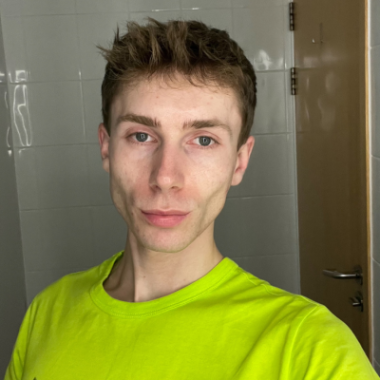
Culture, Environment and Social Change BA – 2026
This course has expanded my understanding of past, present, and future challenges, giving me the knowledge to work towards addressing social and environmental issues.
Why did you choose the University of Westminster?
Westminster was the only university offering my course. I wanted to study something that truly understood the connections between social and environmental issues, and the interdisciplinary Culture, Environment and Social Change BA matched that perfectly.
How has your experience been studying in London?
Studying in London has given me access to an incredible range of cultural experiences – from museums and galleries to events happening across the city. One event that made a real impact on me was the Marxism 2024 Festival. It was a fascinating event, attended by people from across the UK, with a strong theme of social justice running through all the talks. As a Culture, Environment and Social Change student, it really resonated with many of the reasons I chose this course: to one day work in a field where I can make a positive difference. There are also so many organisations here in London working on the issues I care about, which makes my studies feel even more relevant.
What have you particularly enjoyed about your course?
This course has expanded my understanding of past, present, and future challenges, giving me the knowledge to work towards addressing social and environmental issues. The interdisciplinary structure means I’ve studied modules across human rights law, international relations, English, history, and sociology. Adapting my studies to such a wide range of topics has helped me see the systems behind social and environmental injustices. Plus, the variety keeps the course exciting - every lecture is a joy to attend.
How have you found academic support as part of your studies?
The lecturers are always happy to answer questions, and some have even adapted lectures to reflect the interests of the group, which makes learning more engaging and personal. Most modules – especially the core ones – are structured to provide a broad overview before letting students focus on specific areas they’re most interested in.
For example, in the Land, People and Culture module, topics were covered in themed blocks each week. For the assessment, we were encouraged to focus on the areas that spoke to us most. This structure continued into second year with Representations and Theories of Social and Environmental Justice, and I believe it’s also used in the major core module in third year. Tutorials are a great example of how our interests are taken into account. Lecturers always strike a balance between our passions and the module requirements, consistently encouraging us to think outside the box in our approach to topics.
Tell us about any activities you’ve undertaken outside of your course.
In my first year, our whole class was given funded access to exhibitions at the Tate Britain and other museums in London – an amazing opportunity.
Westminster also has a strong and visible LGBTQIA+ community that extends beyond just events. I’ve had multiple queer lecturers, something I had never experienced before. It’s been empowering to see people like me in academic roles – something I hadn’t encountered until coming to Westminster.
The Culture, Environment and Social Change BA course also gives you the chance to explore LGBTQIA+ topics through your studies. I’ve looked at queer stories and protests, focusing one of my assessments on ACT UP’s activist tactics. There are also optional modules with queer themes. I’ve attended the LGBTQIA+ society and connected with other queer students and staff across the university – it’s a really welcoming environment.
What would your advice be to someone considering studying at Westminster?
Find a course that genuinely interests you - studying is so much easier when you love what you're learning. And if you have any questions about a course that aren’t answered on the website, email the course leader! They’re always happy to help.
What’s the best aspect of being a University of Westminster student?
The range of extracurricular opportunities, from international trips to panel discussions with industry experts.
What was the most surprising or unexpected aspect of your Westminster experience?
How fast it’s gone! It feels like just yesterday I was applying, and now I’m writing my dissertation proposal.